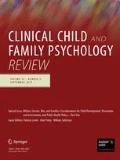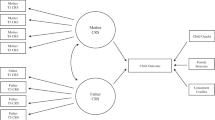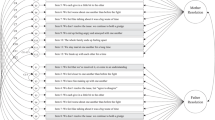Abstract
This review summarizes the literature on the relationship between marital conflict and child maladjustment with an emphasis on variables that qualify, explain the association, or both. Following a historical review, the modest findings on the strength of the association between marital conflict and child maladjustment is explored. The definition of marital conflict is clarified through specification of its various dimensions (frequency, intensity, content, resolution). The role of variables that serve to moderate and/or mediate the relationship between marital conflict and child maladjustment are elaborated. Mediating models include exposure theories (Modeling, Cognitive–Contextual effects: appraisal of threat and blame, and Emotional Insecurity) and changes in the parent–child relationship (Spillover). Variables that moderate or qualify the relationship include children's cognitions and behaviors, contextual factors, and demographic differences. A model is presented summarizing these mechanisms. Research recommendations are proposed and the clinical implications of this literature are addressed.
Similar content being viewed by others
REFERENCES
Ainsworth, M., Blehar, M., Waters, E., & Hall, S. (1978). Patterns of attachment: A psychological study of the strange situation. Hillsdale, NJ: Erlbaum.
Amato, P., & Keith, B. (1991). Parental divorce and the well-being of children: A meta-analysis. Psychological Bulletin, 110, 26-46.
Bandura, A. (1977). Social learning theory. Englewood, NJ: Prentice-Hall.
Baron, R., & Kenny, D. (1986). The moderator-mediator variable distinction in social psychological research: Conceptual, strategic, and statistical considerations. Journal of Personality and Social Psychology, 51, 1173-1182.
Bell, R. (1968). A reinterpretation of the direction of effects in studies of socialization. Psychological Review, 75, 81-95.
Belsky, J., Youngblade, L., Rovine, M., & Volling, B. (1991). Patterns of marital change and parent-child interaction. Journal of Marriage and the Family, 53, 487-498.
Block, J., Block, J., & Gjerde, P. (1986). The personality of children prior to divorce: A prospective study. Child Development, 57, 827-840.
Block, J. H., Block, J., & Morrison, A. (1981). Parental agreement-disagreement on child-rearing orientations and gender-related personality correlates in children. Child Development, 52, 965-974.
Bower, G. (1981). Mood and memory. American Psychologist, 36, 129-148.
Bowlby, J. (1969). Attachment and loss: Vol. 1. Attachment. New York: Basic Books.
Bowlby, J. (1973). Attachment and loss: Vol. 2. Separation. New York: Basic Books.
Brody, G., Arias, I., & Fincham, F. (1996). Linking marital and child attributions to family processes and parent-child relationships. Journal of Family Psychology, 10, 408-421.
Brunk, M., & Henggeler, S. (1984). Child influence on adult controls: An experimental investigation. Developmental Psychology, 20, 1074-1081.
Buchanan, C., Maccoby, E., & Dornbusch, S. (1991). Caught between parents: Adolescents experience in divorced homes. Child Development, 62, 1008-1029.
Chase-Lansdale, P. L., Cherlin, A., & Kiernan, K. (1995). The longterm effects of parental divorce on the mental health of young adults: A developmental perspective. Child Development, 66, 1614-1634.
Cherlin, A., Furstenburg, F., Chase-Landsdale, P., Kiernan, K., Robins, P., Morrison, D., & Teitler, J. (1991). Longitudinal studies of the effects of divorce on children in Great Britain and the United States. Science, 252, 1386-1389.
Clarke-Stewart, K., Vandell, D., McCartney, K., Owen, M., & Booth, C. (2000). Effects of parent separation and divorce on very young children. Journal of Family Psychology, 14, 304-326.
Cohen, J. (1977). Statistical power analysis for the behavioral sciences. New York: Academic Press.
Crockenberg, S., & Forgays, D. (1996). The role of emotion in understanding and emotional reactions to marital conflict. Merrill-Palmer Quarterly, 42, 22-48.
Cummings, E. M., Ballard, M., El-Sheikh, M., & Lake, M. (1991). Resolution and responses to interadult anger. Developmental Psychology, 27, 462-470.
Cummings, E. M., & Cummings, J. S. (1988). A process-oriented approach to coping with adults' angry behavior. Developmental Review, 8, 296-321.
Cummings, E. M., Davies, P., & Simpson, K. (1994). Marital conflict, gender, and appraisals and coping efficacy as mediators of child adjustment. Journal of Family Psychology, 8, 141-149.
Cummings, E. M., Iannotti, R., & Zahn-Waxler, C. (1985). Influence of conflict between adults on the emotions and aggression of young children. Developmental Psychology, 21, 495-507.
Cummings, J. S., Pellegrini, D., Notarious, C., & Cummings, E. M. (1989). responses to angry adult behavior as a function of marital distress and history of interparental hostility. Child Development, 60, 1035-1043.
Cummings, E. M., Vogel, D., Cummings, J. S., & El-Sheikh, M. (1989). responses to different forms of expression of anger between adults. Child Development, 60, 1392-1404.
Cummings, E. M., Zahn-Waxler, C., & Radke-Yarrow, M. (1981). Young responses to expressions of anger and affection by others in the family. Child Development, 52, 1274-1281.
Dadds, M., Atkinson, E., Turner, C., Blums, G., & Lendich, B. (1999). Family conflict and child adjustment: Evidence for a cognitive-contextual model of intergenerational transmission. Journal of Family Psychology, 13, 194-208.
Davies, P., & Cummings, E. (1994). Marital conflict and child adjustment: An emotional security hypothesis. Psychological Bulletin, 116, 387-411.
Davies, P., Myers, R., Cummings, E., & Heindel, S. (1999). Adult conflict history and subsequent responses to conflict: An experimental test. Journal of Family Psychology, 13, 610-628.
Eastbrook, A. A., Cummings, E. M., & Emde, R. (1994). Young responses to constructive marital disputes. Journal of Family Psychology, 8, 160-169.
Emde, R., & Easterbrooks, M. (1985). Assessing emotional availability in early development. In W. Frankenburg, R. Emde, & J. Sullivan (Eds.), Early identification of children at risk: An international perspective (pp. 79-101). New York: Plenum.
Emery, R. (1982). Interparental conflict and the children of discord and divorce. Psychological Bulletin, 92, 310-330.
Erel, O., & Burman, B. (1995). Interrelatedness of marital relations and parent-child relations:Ameta-analytic review. Psychological Bulletin, 118, 108-132.
Fauber, R., Forehand, R., Thomas, A., & Wierson, M. (1990). A mediation model of the impact of marital conflict on adolescent adjustment in intact and divorced families: The role of disrupted parenting. Child Development, 61, 1112-1123.
Fauber, R., & Long, N. (1991). Children in context: The role of the family in child psychotherapy. Journal of Consulting and Clinical Psychology, 59, 813-820.
Fincham, F. (1994). Understanding the association between marital conflict and child adjustment: Overview. Journal of Family Psychology, 8, 123-127.
Fincham, F., Grych, J., & Osborne, L. (1994). Does marital conflict cause child maladjustment? Directions and challenges for longitudinal research. Journal of Family Psychology, 8, 128-140.
Fincham, F., & Osborne, L. (1993). Marital conflict and children: Retrospect and prospect. Clinical Psychology Review, 13, 75-88.
Folkman, S., & Lazarus, R. (1980). An analysis of coping in a middle-aged community sample. Journal of Health and Social Behavior, 21, 219-239.
Gable, S., Belsky, J., & Crnic, K. (1992). Marriage, parenting, and child development: Progress and prospects. Journal of Family Psychology, 5, 276-294.
Goldberg, W., & Eastbrooks, M.A. (1984). Role of marital quality in toddler development. Developmental Psychology, 20, 504-514.
Goodman, S., Barfoot, B., Fryre, A., & Belli, A. (1999). Dimensions of marital conflict and social problem-solving skills. Journal of Family Psychology, 13, 33-45.
Grych, J. (1998). appraisals of interparental conflict: Situational and contextual influences. Journal of Family Psychology, 12, 437-453.
Grych, J., & Fincham, F. (1990). Marital conflict and adjustment: A Cognitive-Contextual framework. Psychological Bulletin, 108, 267-290.
Grych, J., & Fincham, F. (1993). appraisals of marital conflict: Initial investigations of the cognitive-contextual framework. Child Development, 64, 215-230.
Grych, J., Seids, M., & Fincham, F. (1992). Assessing marital conflict from the perspective: The Perception on Interparental Conflict Scale. Child Development, 63, 558-572.
Harold, G., & Conger, R. (1997). Marital conflict and adolescent distress:The role of adolescent awareness. Child Development, 68, 333-350.
Herzberger, S., & Tennen, H. (1986). Coping with abuse: perspectives on their abusive treatment. In N. Ashmore & D. Brodzinsky (Eds.), Thinking about the family: Views of parents and children (pp. 277-300). Hillsdale, NJ: Earlbaum.
Hetherington, E. (1984). Stress and coping in children and families. In N. Doyle, D. Gold, & D. Moskowitz (Eds.), Children and families under stress (pp. 7-33). San Francisco: Jossey-Bass.
Hetherington, E., & Clingempeel, W. (1989). Coping with family transitions:Winners, losers, and survivors. Child Development, 60, 1-14.
Hetherington, E. M., Cox, M., & Cox, R. (1979). Play and social interaction in children following divorce. Journal of Social Issues, 4, 26-49.
Hetherington, E. M., Cox, M., & Cox, R. (1982). Effects of divorce on parents and children. In M. Lamb (Ed.), Nontraditional families: Parenting and child development (pp. 233-288). Hillsdale, NJ: Erlbaum.
Holden, G., & Ritchie, K. (1991). Linking extreme marital discord, child rearing, and chuild behavior problems: Evidence from battered women. Child Development, 62, 311-327.
Howes, P., & Markman, H. (1989). Marital quality and child functioning: A longitudinal investigation. Child Development, 60, 1044-1051.
Jenkins, J., & Smith, M. (1990). Factors protecting children living in disharmonious homes: Maternal reports. Journal of the American Academy of Child and Adolescent Psychiatry, 29, 60-69.
Jockin, V., McGue, M., & Lykken, D. (1996). Personality and divorce: A genetic analysis. Journal of Personality and Social Psychology, 71, 288-299.
Johnston, J. R., Gonzalez, R., & Campbell, L. (1987). Ongoing postdivorce conflict and child disturbance. Journal of Abnormal Child Psychology, 497-509.
Jouriles, E., Baring, J., & O'Leary, K. (1987). Predicting child behavior problems in maritally violent families. Journal of Abnormal Child Psychology, 15, 165-173.
Jouriles, E., Farris, A., & McDonald, R. (1991). Marital functioning and child behavior: Measuring specific aspects of the marital relationship. In (Ed.), Advances in family intervention, assessment and theory (pp. 25-46). London: Jessica Kingsly.
Kerig, P. (1996). Assessing the links between interparental conflict and child adjustment: The Conflicts and Problem-Solving Scales. Journal of Family Psychology, 10, 454-473.
Kerig, P., Cowan, P., & Cowan, C. (1993). Marital quality and gender differences in parent-child interaction. Developmental Psychology, 29, 931-939.
Lindahl, K., & Malik, N. (1999). Marital conflict, family process, and boys' externalizing behavior in Hispanic American and European American families. Journal of Clinical Child Psychology, 28, 12-24.
Margolin, G. (1981). The reciprocal relationship between marital and child problems. In J. Vincent (Ed.), Advances in family intervention, assessment, and theory (Vol. 2, pp. 131-182). Greenwich, CT: JAI Press.
Minuchin, S. (1974). Families and family therapy. Cambridge: Harvard University Press.
Nasby, W. (1996). Moderators of mood-congruent encoding and judgment: Evidence that elated mood and depressed mood implicate distinct processes. Cognition and Emotion, 10, 361-377.
Nasby, W., & Yando, R. (1982). Selective encoding and retrieval of affectively valent information: Two cognitive consequences of mood states. Journal of Personality and Social Psychology, 43, 1244-1253.
Needlemen, H. L., & Gatsonis, C. A. (1990). Low-level lead exposure and the IQ of children. Journal of the American Medical Association, 263, 673-678.
Osborne, L., & Fincham, F. (1996). Marital conflict, parent-child relationships, and child adjustment: Does gender matter? Merrill-Palmer Quarterly, 42, 48-75.
Owen, M., & Cox, M. (1997). Marital conflict and the development of infant-parent attachment relations. Journal of Family Psychology, 11, 152-164.
Purcell, D., & Kaslow, N. (1994). Marital discord in intact families: Sex differences in child adjustment. American Journal of Family Therapy, 22, 356-370.
Rutter, M. (1971). Parent-child separation. Psychological effects on the children. Journal of Child Psychology and Psychiatry, 12, 233-260.
Rutter, M. (1979). Protective factors in responses to stress and disadvantage. In M. Kent & J. Rolf (Eds.), Primary prevention in psychopathology: Social competence in children (pp. 95-113). Hanover, NH: University Press of New England.
Rutter, M. (1994). Family discord and conduct disorder: Cause, consequence, or correlate? Journal of Family Psychology, 8, 170-186.
Sher, K. (1991). Children of alcoholics: A critical appraisal of theory and research. Chicago: The University of Chicago Press.
Smith, A. H., Hadley, M. A., & Wood, R. (1990). Epidemiological evidence indicates asbestos causes laryngeal cancer. Journal of Occupational Medicine, 32, 499-507.
Snyder, J. (1998). Marital conflict and child adjustment:What about gender? Developmental Review, 18, 390-420.
Sperling, M., & Berman, W. (Eds.). (1994). Attachment in adults: Clinical and developmental perspectives. New York: Guilford Press.
Stocker, C., & Youngblade, L. (1999). Marital conflict and parental hostility: Links with sibling and peer relationships. Journal of Family Psychology, 13, 598-609.
Stoneman, Z., Brody, G., & Burke, M. (1989). Marital quality, depression, and inconsistent parenting: Relationship with observed mother-child conflict. American Journal of Orthopsychiatry, 59, 105-117.
Welton, D. C., Kemper, H. C., Post, G. B., & van Staveron, W. A. (1995). Ameta-analysis of the effect of calcium intake on bone mass in young and middle aged females and males. Journal of Nutrition, 125, 2802-2813.
Wolfe, D., Jaffe, P., Wilson, S., & Zak, L. (1985). Children of battered women: The relation of child behavior to family violence and maternal stress. Journal of Consulting and Clinical Psychology, 53, 657-665.
Wolfe, D., Zak, L., Wilson, S., & Jaffe, P. (1986). Child witnesses to violence between parents: Critical issues in behavioral and social adjustment. Journal of Abnormal Child Psychology, 14, 95-104.
Author information
Authors and Affiliations
Rights and permissions
About this article
Cite this article
Zimet, D.M., Jacob, T. Influences of Marital Conflict on Child Adjustment: Review of Theory and Research. Clin Child Fam Psychol Rev 4, 319–335 (2001). https://doi.org/10.1023/A:1013595304718
Issue Date:
DOI: https://doi.org/10.1023/A:1013595304718




